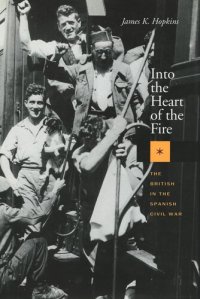
Ebook: Into the Heart of the Fire: The British in the Spanish Civil War
Author: James K. Hopkins
- Year: 2022
- Publisher: Stanford University Press
- Language: English
- pdf
This book provides a compelling and vivid account of British involvement in the Spanish Civil War, examining the experience of the British volunteers in the International Brigades, and placing them in a broad intellectual, political, social, and cultural framework. Incorporating some familiar and many new voices of a turbulent decade, it analyzes the manner in which British men and women conceptualized their engagement with the political issues of their time—whether they were Oxbridge aesthetes or militants from the factories, the mines, and the ranks of the unemployed. The event that galvanized the volunteers and the many thousands who supported them in Great Britain was the rising of General Franco and his allies against the democratically elected Second Spanish Republic on July 17, 1936. As a counterpart to German and Italian intervention on behalf of the insurgents, the Soviet Union instructed the Comintern to recruit and organize an international volunteer army to come to the aid of the Republic. The International Brigades quickly achieved mythical status as the century's most conspicuous example of dedicated idealism, serving the cause of democracy in peril. The early "spontaneous" fighters and, later, the British Battalion in the XVth International Brigade, which included some 2,000 volunteers, fought in every major campaign of the war; about 85 percent of the Battalion's members were killed or wounded. The author is the first scholar to make systematic use of the recently opened archive of the International Brigades in Moscow, enabling him to take the measure of the nobility and tragedy of the British sacrifice in Spain. His study confirms popular mythology about the International Brigades in certain respects and sharply disputes it in others. Above all, Into the Heart of the Fire establishes the fact that the British volunteers were not social or neurotic misfits. Rather, they reflected in a distinctive way the political concerns of many of their generation.